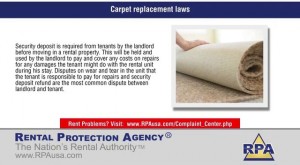Texas Rental Laws Regarding Carpet Replacement
Ordinary wear and tear does not justify a deduction from your deposit.
Texas rental laws regarding carpet replacement. Security deposit is required from tenants by the landlord before moving in a rental property. This will be held and used by the landlord to pay and cover any costs on repairs for any damages the tenant might do with the rental unit during his stay. The texas property code specifically eliminates deterioration that results from negligence carelessness accident or abuse of the premises equipment or chattels by the tenant by a member of the tenant s household or by a guest or invitee of the tenant from their definition of wear and tear. In fact he is entitled to deduct damages from your security deposit.
But if the carpet is damaged she says it will be replaced at turnover before a new tenant moves in. If the landlord has to replace the entire carpet two years before the end of the carpet s life expectancy then the tenant would pay the equivalent of two years worth of the carpet s price. Related articles 5 spine tingling stories from exterminators and what they learned. If you ve damaged the carpet the landlord is not likely to replace it on his dime.
There is no law in texas how often the carpets have to be changed in apartments. A tenant is required to pay a security deposit to a landlord upon signing of lease agreement and moving in. Carpet replacement is one of the most common problems tenants face with their security deposit. Tenant laws on carpet replacement by tenant.
I know someone who has lived in the same apartment for over 20 years with the same carpets. So if the carpet has a ten year life expectancy the tenant would pay two tenths of the carpet s total price. There are however laws. Carpet replacement laws by tenant.
If a lease exists written or oral or if a landlord has previously accepted payment as rent a texas renter has certain rights under texas landlord tenant law tx property code chapter 92 these include protections from illegal evictions the right to repair and deduct and more. In some states the landlord may bring legal action against a former tenant if the damage exceeds the security deposit.


















